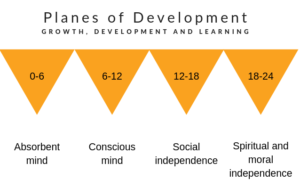By Kala Reyes — Rewarewa Head Teacher – Preschool
Dr Montessori believed that education must begin at birth. In her observations, she detailed four distinct planes of development from birth up to the age of 24. Each plane has specific characteristics that corresponds to the child’s developmental needs. Ideally, if these needs are met, there should be a seamless transition from one plane to the next; whereby the first plane prepares the child for the next and the second plane completes the first.
The First Plane: 0 to 6 years
The most striking characteristic of the child at this period is his absorbent mind. With this kind of mind, the child absorbs and adapts to the culture of his environment, and acquires a mother tongue in all its completeness and complexities. The child is a sensorial learner and builds his intellect by exploring a prepared environment that functions as ‘keys to the world.’ Human tendencies (orientation, order, exploration, etc.) and sensitive periods (language, movement, refinement of the senses, etc.) guide the child in his learning. The foundation for future learning is established in this plane.
The Second Plane: 6 to 12 years
Dr Montessori called this period the “age of instruction” — a fitting phrase since the child wants to know the hows and whys of things, the cause and effect, and the relationship between objects. The child moves from the sensorial to the abstract. Social connections become important; friendships are formed and the child is able to work cooperatively within a team setting. This plane recognises the child’s need for a wider environment, the use of a reasoning mind, and the development of moral sense. The materials in the Montessori primary environment are now the ‘keys to the universe’ and part of what Dr Montessori called Cosmic Education that highlights the interconnection of everything in the world.
The Third Plane: 12 years to 18 years
The adolescent at 12-15 is both sensitive and vulnerable. There is a need for him to belong and feel valued by his peers. It is not unusual to hear phrases such as “nobody understands me” or “leave me alone.” At 15-18, they seek to understand their place in society and how to contribute. The express themselves creatively, learning becomes practical and experiential, and they start developing political ideas. As Dr Montessori said, “these children want to make a direct contribution to society and have it recognized”.
The Fourth Plane: 18 years to 24 years
In this plane, young adults develop a true sense of who they are as individuals. They are ready to make their own decisions, to take their place in the world, and to establish social and economic independence. They may choose to study further, to travel, or to find employment as the need to become financially independent grows. They might be living away from home for the first time and use this time to focus on a career path.
Montessori education encourages the development of the whole child in all these stages; and one of our roles as guides is to prepare an environment rich with learning experiences suited to the children’s age and natural inclinations. It is a privilege to be part of children’s self-construction towards the adults they will one day become.
